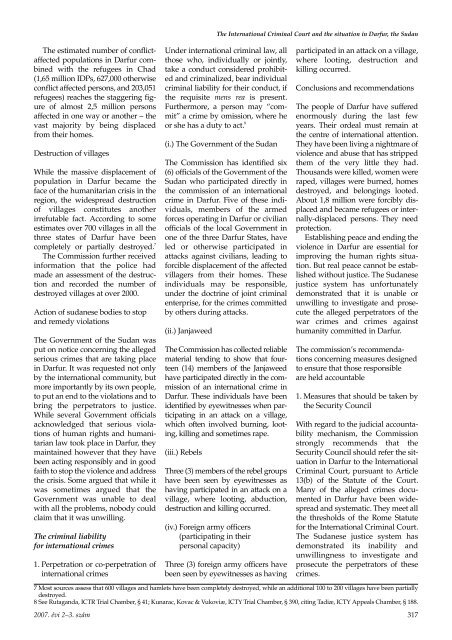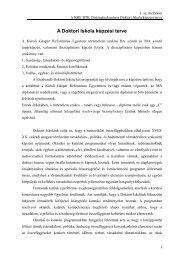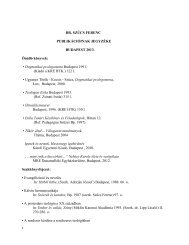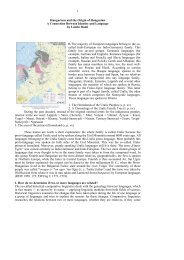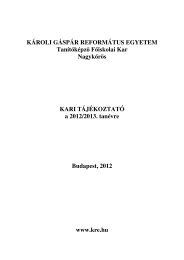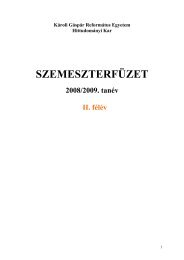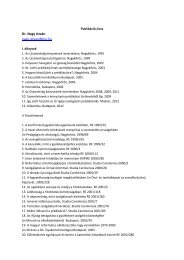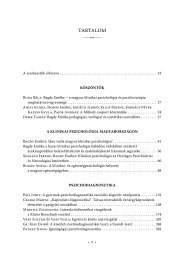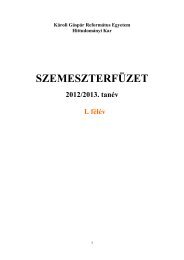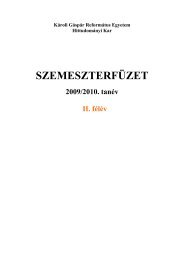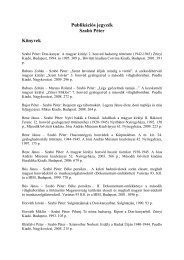collega - Károli Gáspár Református Egyetem
collega - Károli Gáspár Református Egyetem
collega - Károli Gáspár Református Egyetem
You also want an ePaper? Increase the reach of your titles
YUMPU automatically turns print PDFs into web optimized ePapers that Google loves.
The International Criminal Court and the situation in Darfur, the Sudan<br />
The estimated number of conflictaffected<br />
populations in Darfur combined<br />
with the refugees in Chad<br />
(1,65 million IDPs, 627,000 otherwise<br />
conflict affected persons, and 203,051<br />
refugees) reaches the staggering figure<br />
of almost 2,5 million persons<br />
affected in one way or another – the<br />
vast majority by being displaced<br />
from their homes.<br />
Destruction of villages<br />
While the massive displacement of<br />
population in Darfur became the<br />
face of the humanitarian crisis in the<br />
region, the widespread destruction<br />
of villages constitutes another<br />
irrefutable fact. According to some<br />
estimates over 700 villages in all the<br />
three states of Darfur have been<br />
completely or partially destroyed. 7<br />
The Commission further received<br />
information that the police had<br />
made an assessment of the destruction<br />
and recorded the number of<br />
destroyed villages at over 2000.<br />
Action of sudanese bodies to stop<br />
and remedy violations<br />
The Government of the Sudan was<br />
put on notice concerning the alleged<br />
serious crimes that are taking place<br />
in Darfur. It was requested not only<br />
by the international community, but<br />
more importantly by its own people,<br />
to put an end to the violations and to<br />
bring the perpetrators to justice.<br />
While several Government officials<br />
acknowledged that serious violations<br />
of human rights and humanitarian<br />
law took place in Darfur, they<br />
maintained however that they have<br />
been acting responsibly and in good<br />
faith to stop the violence and address<br />
the crisis. Some argued that while it<br />
was sometimes argued that the<br />
Government was unable to deal<br />
with all the problems, nobody could<br />
claim that it was unwilling.<br />
The criminal liability<br />
for international crimes<br />
1. Perpetration or co-perpetration of<br />
international crimes<br />
Under international criminal law, all<br />
those who, individually or jointly,<br />
take a conduct considered prohibited<br />
and criminalized, bear individual<br />
criminal liability for their conduct, if<br />
the requisite mens rea is present.<br />
Furthermore, a person may “commit”<br />
a crime by omission, where he<br />
or she has a duty to act. 8<br />
(i.) The Government of the Sudan<br />
The Commission has identified six<br />
(6) officials of the Government of the<br />
Sudan who participated directly in<br />
the commission of an international<br />
crime in Darfur. Five of these individuals,<br />
members of the armed<br />
forces operating in Darfur or civilian<br />
officials of the local Government in<br />
one of the three Darfur States, have<br />
led or otherwise participated in<br />
attacks against civilians, leading to<br />
forcible displacement of the affected<br />
villagers from their homes. These<br />
individuals may be responsible,<br />
under the doctrine of joint criminal<br />
enterprise, for the crimes committed<br />
by others during attacks.<br />
(ii.) Janjaweed<br />
The Commission has collected reliable<br />
material tending to show that fourteen<br />
(14) members of the Janjaweed<br />
have participated directly in the commission<br />
of an international crime in<br />
Darfur. These individuals have been<br />
identified by eyewitnesses when participating<br />
in an attack on a village,<br />
which often involved burning, looting,<br />
killing and sometimes rape.<br />
(iii.) Rebels<br />
Three (3) members of the rebel groups<br />
have been seen by eyewitnesses as<br />
having participated in an attack on a<br />
village, where looting, abduction,<br />
destruction and killing occurred.<br />
(iv.) Foreign army officers<br />
(participating in their<br />
personal capacity)<br />
Three (3) foreign army officers have<br />
been seen by eyewitnesses as having<br />
participated in an attack on a village,<br />
where looting, destruction and<br />
killing occurred.<br />
Conclusions and recommendations<br />
The people of Darfur have suffered<br />
enormously during the last few<br />
years. Their ordeal must remain at<br />
the centre of international attention.<br />
They have been living a nightmare of<br />
violence and abuse that has stripped<br />
them of the very little they had.<br />
Thousands were killed, women were<br />
raped, villages were burned, homes<br />
destroyed, and belongings looted.<br />
About 1,8 million were forcibly displaced<br />
and became refugees or internally-displaced<br />
persons. They need<br />
protection.<br />
Establishing peace and ending the<br />
violence in Darfur are essential for<br />
improving the human rights situation.<br />
But real peace cannot be established<br />
without justice. The Sudanese<br />
justice system has unfortunately<br />
demonstrated that it is unable or<br />
unwilling to investigate and prosecute<br />
the alleged perpetrators of the<br />
war crimes and crimes against<br />
humanity committed in Darfur.<br />
The commission’s recommendations<br />
concerning measures designed<br />
to ensure that those responsible<br />
are held accountable<br />
1. Measures that should be taken by<br />
the Security Council<br />
With regard to the judicial accountability<br />
mechanism, the Commission<br />
strongly recommends that the<br />
Security Council should refer the situation<br />
in Darfur to the International<br />
Criminal Court, pursuant to Article<br />
13(b) of the Statute of the Court.<br />
Many of the alleged crimes documented<br />
in Darfur have been widespread<br />
and systematic. They meet all<br />
the thresholds of the Rome Statute<br />
for the International Criminal Court.<br />
The Sudanese justice system has<br />
demonstrated its inability and<br />
unwillingness to investigate and<br />
prosecute the perpetrators of these<br />
crimes.<br />
7 Most sources assess that 600 villages and hamlets have been completely destroyed, while an additional 100 to 200 villages have been partially<br />
destroyed.<br />
8 See Rutaganda, ICTR Trial Chamber, § 41; Kunarac, Kovac & Vukoviæ, ICTY Trial Chamber, § 390, citing Tadiæ, ICTY Appeals Chamber, § 188.<br />
2007. évi 2–3. szám<br />
317


